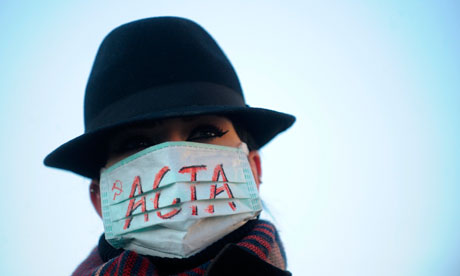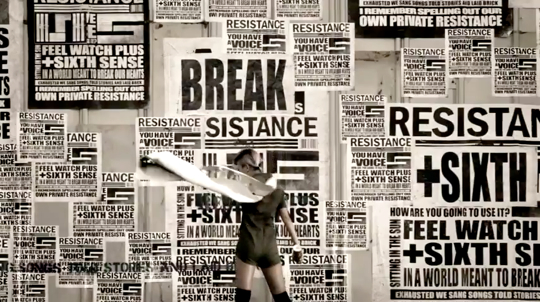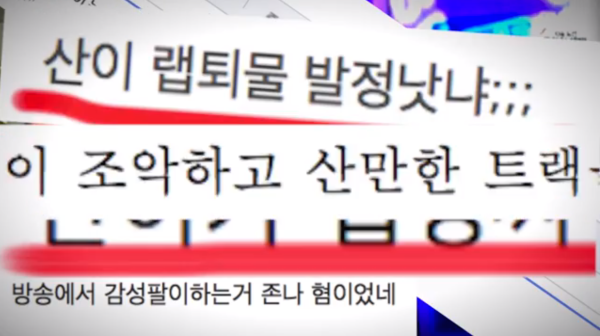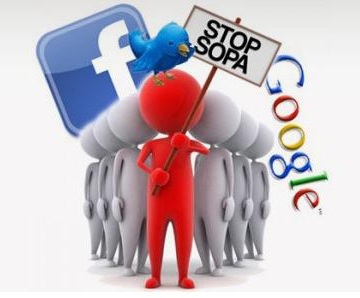 Time for us to get serious for a moment, and talk politics.
Time for us to get serious for a moment, and talk politics.
A couple of months ago, fellow writer Nabeela wrote a post speculating about the potential effects of SOPA on our online K-pop livelihood if it were to pass. Today, we will be taking a look at the issue of SOPA from a hindsight perspective, as well as looking further into similar policies across the globe, and what they hold for the future of K-pop.
Since this is a pretty lengthy topic, I’ve enlisted the help of Gil and Fannie to help me to cover different aspects of the issue.
Gil will start the article off by providing an overview of the recent events that brought about the downfall of SOPA. Fannie will elaborate about our dependence (as international K-pop consumers) on material that may violate certain copyright claims, and then go on to look at international policies that currently pose a threat to our internet freedoms (with a focus on Europe). To bring it into full circle, I (Maddie) will then take a look at South Korea as a model for the future internet and music industries.
What was SOPA/PIPA?
On January 18th, 2012, many high school and college students hoping for a quick review of whatever assignment they didn’t read stumbled upon a blacked out Wikipedia page. It turns out, the popular website had been shut down for a full day in protest to the Stop Online Piracy Act (SOPA) bill being deliberated in the House of Representatives. Other websites that participated in this online blackout included but was not limited to high-profile websites such as Google, Reddit, and Mozilla as well as approximately 7000 smaller websites, who coordinated to posting blurbs, links, and images that helped spread awareness of the threat that SOPA and its equivalent in the Senate, the Protect IP Act (PIPA), posed to the Internet at large.
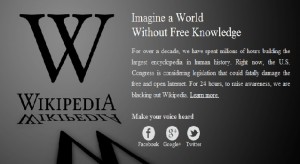 So what was SOPA and why was it so objectionable in the first place?
So what was SOPA and why was it so objectionable in the first place?
What the bill — introduced by Representative Lamar Smith of Texas and supported by the MPAA — effectively was designed to do was to reduce access to websites “dedicated to infringing activities” and operating outside of US borders.
Sounds perfectly reasonable, right?
The problem with the bill was that it was so broad in scope and vaguely worded that it actually gave government as well as large corporations (such as giant media companies) way too much power to exercise against peoples’ freedom of expression.
In Section 103, Subpoint b the bill outlined its target:
“The U.S. directed site is primarily designed or operated for the purpose of, has only limited purpose or use other than or is marketed by its operator or another acting in concert with that operator for use in offering goods or services in a manner that engages in, enables or facilitates — a violation of section 501…”
To put it in blunt terms, SOPA would have helped to legally enact a powerful form of online censorship at the whims of the government and major corporations. Here are some consequences of the bill had it come to pass (and more here and here):
- The US government and copyright holders would be given the authority to seek court orders against any website in any way suspected to be associated with copyright violation
- Private parties would able to directly contact payment network providers to block a site’s traffic, search traffic, and ad revenue without prior notice or a judicial hearing. This is a direct violation of the First Amendment.
- The US government would be allowed to block US citizens from visiting websites on their blacklist in the form of DNS blocking (the same method that is used in China, Iran, and Syria)
- A single infringing link would be enough to warrant blocking a site full of otherwise legal material. In addition, sites would be held responsible for user-submitted content. To put it in physical terms, say someone brought a disk of pornography into a library and accidentally left it on the shelf, and the disk is later discovered during a routine inspection. The entire library could be shut down due to this incident, despite that they had no hand in orchestrating it.
- Links shared through email or social networking sites could be closely monitored or censored
- A higher legal risk means less incentive for web innovation and less launching of start-ups
Luckily, the January 18th Internet Blackout was able to get enough people aware of and talking about the issue that it managed to even grab the attention of the mainstream national media.
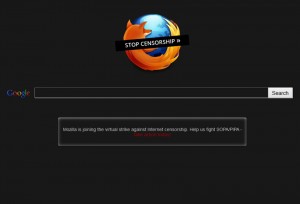 In addition, grassroots activism such as people calling their Congressmen, protesting, signing petitions (4.5 million people signed Google’s anti-SOPA petition in that one day), and tweeting the message resulted soon after in changing quite a few Congressman’s minds. (We have to remember that computers have only been widely used in the last decade or two while many of these politicians are well into their fifties or beyond, meaning that their understanding of the internet and its integral relationship with the youth generation is limited at best.)
In addition, grassroots activism such as people calling their Congressmen, protesting, signing petitions (4.5 million people signed Google’s anti-SOPA petition in that one day), and tweeting the message resulted soon after in changing quite a few Congressman’s minds. (We have to remember that computers have only been widely used in the last decade or two while many of these politicians are well into their fifties or beyond, meaning that their understanding of the internet and its integral relationship with the youth generation is limited at best.)
As a result, both bills were successfully pressured to be taken off the table… for further study. Victory..?!
How would SOPA/PIPA have affected us in relation to K-pop?
Let’s put this in the context of Seoulbeats: we blog extensively about K-pop, a niche of entertainment which includes a lot of music, television shows (dramas, performance shows, variety shows), and movies that are all susceptible to being pirated. Seoulbeats itself obviously does not host pirated material, but regardless, under SOPA, we would have still been fair game to whims of private outside interests. For example, if we happened to embed a video in one of our articles that was not obtained from an official source, or if one of our commenters happened to link to an outside site that happened to be guilty of copyright violation, access to our site could be taken down immediately and without prior notice.
 And it wouldn’t have just affected this site, but almost all K-pop sites as well as hosting services across the Internet because lets just be honest here: the majority of the material that we consume as international K-pop fans leads — in one way or another — to a violation of copyright claims.
And it wouldn’t have just affected this site, but almost all K-pop sites as well as hosting services across the Internet because lets just be honest here: the majority of the material that we consume as international K-pop fans leads — in one way or another — to a violation of copyright claims.
This network relay of virtual information is largely due to the voluntary efforts led by fans along every step of the process: from the uploaders, to teams of dedicated subbers, to distributors who share and relay the upload links through forums and other websites, to those of us who are the final consumers of the product, who may not commit any action other than simply clicking a play button on a site. Every single participant along this chain of actions is guilty.
However, we also have to consider that what is particularly unique about the spread of K-pop is that it is largely as the result of all this activity — all of this questionably illegal activity, might I add — that has gotten their precious Hallyu to where it is today.
Can you imagine what K-pop would be like if the only videos you had access to were those uploaded to the official YouTube or Facebook accounts of companies? Or if we had virtually no access to any variety show footage (it seems highly unlikely that they would be uploaded — much less subbed)? Or if we actually had to buy hard copy DVD sets of dramas and movies in order to watch them (again, most likely without subtitles)? It certainly wouldn’t be the K-pop as you know it today, we wouldn’t know our beloved idols on as intimate a basis as we think we do, and we ourselves would be very different consumers (after all, we can only consume what we have access to) as well.
The bigger question is: Would it be in the best interests of K-pop to enact this type of hyper-regulation?
The push to protect copyrighted material in itself is a noble and worthy cause, but the mode of execution is another matter altogether. I actually think that the issue can be addressed simply by looking at the supply and demand. People pirate material because there is less supply (either in content quality, or in format quantity) than there is demand. The most effective answer to this problem shouldn’t be to solely focus on wiping out the symptom (pirating), but also to address the source. Why are people pirating? Have their needs changed and developed alongside the ever-changing and ever-developing technologies? Can it be that perhaps people are finding ways to circumvent a system that is simply archaic and cumbersome to their needs? Perhaps the current system needs to be redesigned or overhauled?
And would the potential monetary gain (by defending copyright claims) be able to make up for the subsequent loss of international fan attention? I wouldn’t be too sure about that…
Global Internet Policies and Programs: ACTA
It seems like the fanfare “death” of SOPA would have resulted in a sound a victory, right? While it certainly is something to be celebrated and no small feat, the sad truth is that in fact, it is only the beginning of a series of small battles within the context of a larger war: a digital information war. In fact, the retaliation shot has already been fired from the federal end, with the shutdown of the popular file-sharing site MegaUpload (as well as the arrests of its operators) the day after Internet Blackout (read more, here).
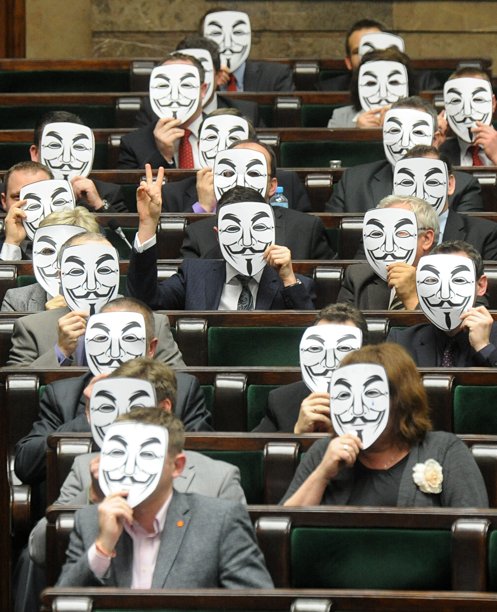 Although the short attention span of the media and mainstream public has already been diverted towards other matters, those that are still following the issue are keenly aware that the death of these bills is not the end all be all to threats against privacy or free speech on the internet. We may have beaten these current variations of SOPA and PIPA, but with the MPAA and lobbyists from other corporate media interests still lining the pockets of our politicians, the same ideas will be bound to pushed into consideration again and again, under many different guises and reincarnations, until one manages to slip on through.
Although the short attention span of the media and mainstream public has already been diverted towards other matters, those that are still following the issue are keenly aware that the death of these bills is not the end all be all to threats against privacy or free speech on the internet. We may have beaten these current variations of SOPA and PIPA, but with the MPAA and lobbyists from other corporate media interests still lining the pockets of our politicians, the same ideas will be bound to pushed into consideration again and again, under many different guises and reincarnations, until one manages to slip on through.
In fact, these alternate forms already are being pushed. Lamar Smith, the same congressman who fathered SOPA, has had another bill in the works for a while now called The Protecting Children From Internet Pornographers Act. While intentions on the surface may be noble, this bill would basically mandate Internet providers to track each and every person’s Internet activity (including information such as your name, address, IP address, and bank and credit card numbers) on a daily basis, and store it on record for up to 18 months. All this just to catch a handful of child pornographers. In effect, this law would be a huge violation of privacy, because it turns every single Internet user into a federal suspect, regardless of gender, age, or personal history. How ridiculous is that?
The push for related legislation isn’t restricted to the US, either. In fact, Spain has recently enacted a Sinde Law similar to the SOPA (according to Wikileaks sources, the US likely pushed them into it). Another alarming development on international front is the ACTA (Anti-Counterfeiting Trade Agreement) — whose purpose is to “increase and harmonise copyright and trademark enforcement.” This global “trade” agreement was negotiated over the past three years, and then signed more recently by a number of countries across the globe, including Australia, Canada, Japan, Morocco, New Zealand, Singapore, South Korea, and the US. The EU has also signed, although its member states and the EU parliament are at varying steps in the process of deliberation as to whether to ratify the agreement.
[youtube http://www.youtube.com/watch?v=cjsa0HA8GSU&w=560&h=315]
Many of the goals of the ACTA (more about it here) are similar to those of the SOPA and the PIPA, except that some argue that it may be even worse, not only because it is a multi-national agreement, but also because it was brought about by a series of negotiations so secretive and underhand that it even led to official chastisement by the European Parliament itself. Once it was brought into the light of public awareness — in no small part riding on the momentum of clarity gleaned from the SOPA debacle — widespread petitions and protests began taking place in the EU, from vehement protests taking place earlier on in Poland, to the recent string of anti-ACTA demonstrations held this past weekend in over 200 European cities (the biggest turnout was in Bulgaria, where an estimated 50,000 people took part).
However, with a more widely dispersed (and therefore less organized) distribution of protests, as well as spotty coverage in the mainstream media (and perhaps a varied sentiment of futility), it is unknown whether or not the ACTA protests will be able to harness enough power to achieve its ends… but success has already broken in the fact that the youth of this generation are beginning to wake up from their political slumber and fight for their rights.
South Korea: Model of Future Internet and Music Industry
 The internet can be coldly defined as a global network made up of billions of interconnected private, public, academic, business and government networks. Yet, when viewing an image of routing paths it is difficult not to notice how it resembles a pulsating and organic system of over 2 billion users sharing information, transferring large amounts of data and communicating on a global scale.
The internet can be coldly defined as a global network made up of billions of interconnected private, public, academic, business and government networks. Yet, when viewing an image of routing paths it is difficult not to notice how it resembles a pulsating and organic system of over 2 billion users sharing information, transferring large amounts of data and communicating on a global scale.
Presently, the world is divided into five RIRs (regional internet registry) belonging to the Regional Internet Registry system which manages and delegates internet numbers (i.e. IP addresses and autonomous system numbers) to their customers (internet service providers and end-user organizations) within each of their respective regions.
The Asia-Pacific Network Information Centre region alone is expected to represent most of the Internet’s presence within the next decade.
With Internet users exceeding 500 million in China, estimated at 99.1 million in Japan, 39.4 million in South Korea and 29.7 million in the Philippines, a title once belonging to the United States now belongs to one of the most technologically advanced and piracy prone regions of the world.
From Swedish BitTorrent website Pirate Bay.org to Hong Kong based file-hosting site Megaupload.com, the battle against piracy, copyright infringement, peer-to-peer file sharing and illegal downloading has gone hand in hand with the pro-piracy and anti-copyright movements, and the fight for Freedom of Knowledge and right to Intellectual Freedom. Prior to SOPA and PIPA, the Recording Industry Association of America (RIAA) along with the Motion Picture Association of America (MPAA) have not only filed lawsuits against file sharing service sites. They have also hired technology companies like MediaDefender and Aiplex Software to poison Torrent sites with corrupt data under misleading file names in order to tie up users’ computers and bandwidth as well as making certain sites unavailable to users through denial-of-service attacks. The entertainment industry has also made claims against South Korea calling it a “piracy haven” leading to the “3 strikes” policy effective in July 2009.
 After putting much government effort in turning into one of the most technological countries in the world, South Korea prides itself as one of the most wired countries in the world. With a population estimated at 48.6 million, around 16.8 million households are connected to high-speed broadband services, 6.5 million smartphone users have mobile penetration exceeding 100%, and they still strive to become even more advanced.
After putting much government effort in turning into one of the most technological countries in the world, South Korea prides itself as one of the most wired countries in the world. With a population estimated at 48.6 million, around 16.8 million households are connected to high-speed broadband services, 6.5 million smartphone users have mobile penetration exceeding 100%, and they still strive to become even more advanced.
Initially, copyright and piracy issues weren’t taken into account, but by 2008 the Intellectual Property Alliance estimated that 70% of the music downloaded in South Korea was pirated.
Suggested by the Grand National Party (GNP) of South Korea and supported by telecommunications and broadcasting regulator, the Korean Communications Commission (KCC), the “3 strikes” rule was viewed as a solution to cope with online piracy within South Korea. Expected to cause chaos due to its vague definition of copyright and broad interpretation of whom would be considered an offender, this rule granted the Minister of Culture, Sports and Tourism authority to close online message boards and suspend User accounts without request from copyright holders. Internet users, Internet companies, media organizations and bloggers alike would be held to account for any pirated content posted onto sites and online message boards as well as any pirated content repeatedly uploaded.
With the first offense resulting in 1 month suspension, 2nd offense up to 3 month suspension and the 3rd offense up to 6 months suspension, Internet companies like Naver faced the possibility of being shut down fairly easily while Internet users faced losing their accounts. Yet, despite online protests from Internet companies and civil liberties advocates, the National Assembly passed an anti-file sharing provision in April of 2009. Not only was South Korea removed from the piracy watch list in 2009, after being on it for 20 years, but it also was one of the first Democracies to aggressively use the law to combat online copyright infringement and online piracy becoming a model for the Internet industry.
[youtube http://www.youtube.com/watch?v=MU1hdUQUWkc&w=560&h=315]How has this affected K-pop within the last three years? Well, in contrast to France and Sweden who have faced reduction in music sales since commencement of file-sharing regulations, South Korea’s music sales have continued to grow. In the past decade, recorded-music sales have fluctuated as audiocassettes were replaced by CDs and CDs were replaced with digital music which resulted in a music sales drop of over 2/3 in the trade value between 2001 and 2005. Yet, since 2005 music sales have increased making it a growing music market of which 55% of music sales were digital, and of which digital sales accounted for 61.7% total trade revenues in 2011.
One reason for growth could K-pop’s rise in global popularity owing to YouTube exposure and massive peer-to-peer file sharing sites yet just as with becoming one of the most wired countries the Korean music industry has made technology work for them instead of against. By creating company and artist YouTube channels as well as making more music available internationally through online digital media providers like the iTunes store, Korean Entertainment companies have not turned their backs on what helped 2ne1 become MTViggy’s Best New Band in the World in 2011. Yet, the growth in domestic repertoire is mostly owed to a graduated response program dedicated to file-sharing and the “3 strikes” policy which caused Korean Internet users to jump around from free service sites until they eventually joined legal service music sites. This fact may be used in the United States by lobbyist like the MPAA as justification for Internet anti-copy right regulations.
South Korea isn’t only a model for the Internet Industry, but also a model for the Music industry which has worked alongside the government against illegal downloading and has succeed. Yet, countries like the United States should view South Korea as an example of a country that acknowledges the Internet and all of its possibilities–not through censorship, but through innovation and new strategies. The Korean government and music industry has worked alongside Universal Southeast Asia and the International Federation of the Phonographic Industry to encourage illegal P2P sites to convert into legal sites rather than shutting them down. The industry has supported a large number of legal services even though their standardized service rates are lower than what they hoped for ($5 for 20 tracks; $10 for unlimited access). Also, rather than shutting down sites they have simply filtered infringing content making it more difficult to search for illegal sites. Out of the 100,000 notices of first offense sent out in November of 2010, only 11 received the 3rd notice and had their Internet service suspended for 29 days.
The government has also brought awareness to the consequences of illegal file-sharing through extensive education drives in schools and through the media. As a country whose culture is based on collectivism as opposed to the United States which is more individualistic, working together to reach a main goal and combat online piracy as a whole may seem more attainable in countries like South Korea. Yet, this is no excuse for a Democratic government to decide what we view, read or listen to, or what international and domestic sites we can and cannot have access to within the United States. A government whose politicians that voted against the SOPA and PIPA Acts have received threats by trade associations, like the MPAA, to cut off lobbying contributions. The Internet is a growing and living network of communication with 2 billion global Internet users and only 239.9 million of those users reside within the United States which in 2011 ranked 26th on a global scale in terms of its broadband Internet connection speed (4.8 3mbps) while South Korea (46mpbs) ranked second after Japan (61mbps).
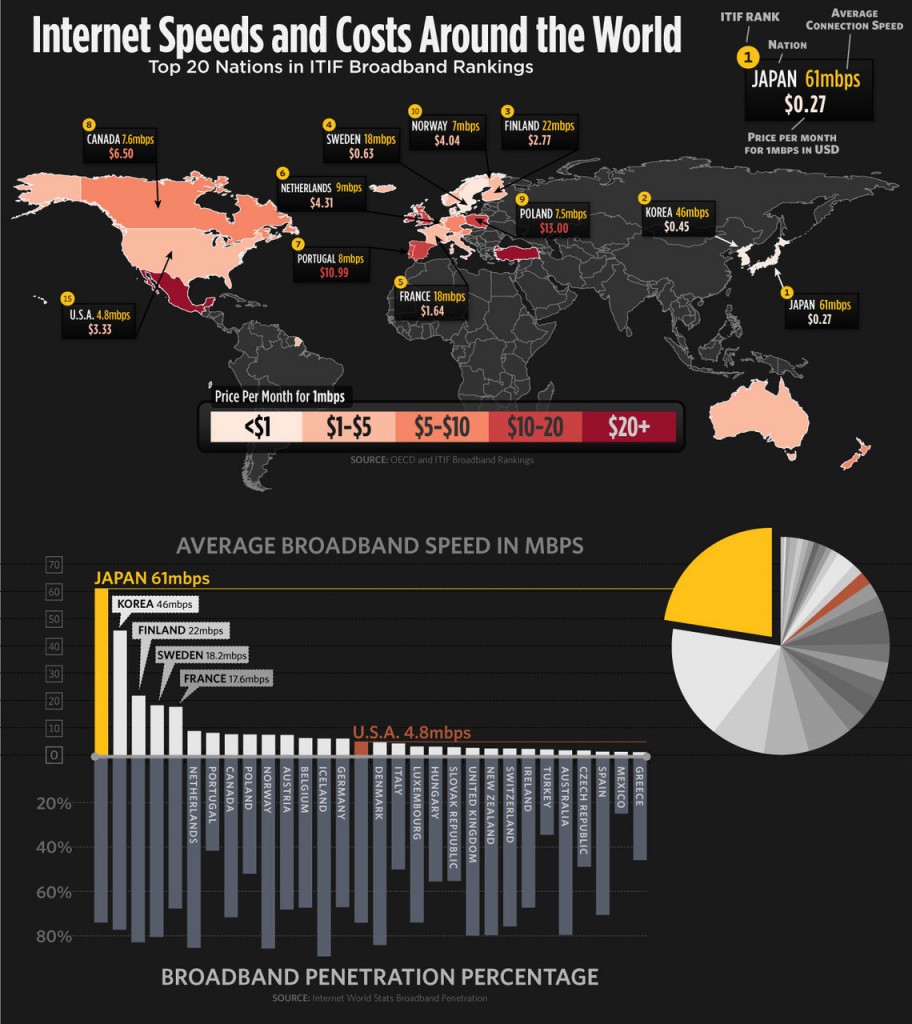
Conclusion
The Internet is a relatively new phenomenon to our lives, and we are still learning how to best implement its use. Naturally when there is new territory, people try to stake claims and create the rules and the regulations that are characteristic of an ordered society. While it is important to try and discourage pirating and protect intellectual property (and this is an issue that DOES need to be addressed), it is equally as important to protect the privacy and freedom of Internet users, as well.
 The problem with these types of policies isn’t the original intent; it is the fact that they can sometimes be too broadly defined, and that lobbyist money often pays its way into the deceptive insertion of sinister policies that go largely unnoticed until too late. Many people — indeed, even congressmen themselves — simply aren’t bothered to read the fine print. However, as the popular saying goes, the devil is in the details.
The problem with these types of policies isn’t the original intent; it is the fact that they can sometimes be too broadly defined, and that lobbyist money often pays its way into the deceptive insertion of sinister policies that go largely unnoticed until too late. Many people — indeed, even congressmen themselves — simply aren’t bothered to read the fine print. However, as the popular saying goes, the devil is in the details.
It is important to note that many of the politicians making decisions on these policies did not grow up in front of a computer, and are simply not as Internet-savvy nor Internet-dependent as the youth of this generation. I don’t think it would be a stretch to say that quite a few of these 30 to 70 year old congressmen voting on the SOPA simply weren’t aware of why it was such a big issue in the first place, before public outcry alerted them to the fine print. It is your duty as a citizen of the Internet (regardless of age) to educate yourself, be vigilant, and stand up for your own rights before they get taken away by others. A true democracy can only function properly when based upon the assumption that all its citizens are politically active and making well-educated, well-informed decisions.
The Internet is — and this is quite scary to admit — probably the last medium we have that encourages true freedom of speech, and this is a liberty that every person should be fighting to preserve.
So how can you get involved, you ask? How can you help to preserve our Internet experience as a whole?
The first step is to educate yourself. If you’ve made it to the end of this lengthy article, you’re already off to a great start. Be an active citizen by helping spread the word to all of your friends and acquaintances across the Internet. Spread it to all your K-pop circles; they need to be informed of these issues that in the future are going create major ripples in our daily Internet lives. And lastly, become involved in the political process itself. This can be as simple as staying updated on the news, phoning your political representative to voice your opinion on an issue, joining interest groups at school, or signing online petitions in protest against the ACTA or similar legislation that infringes on our rights.
(MPG, TorrentFreak, Music and Copyright , Korea Times, Internet World Stats, Daily Info Graphic, MTV K, Tea Party Tribune, AmericanCensorship, Scribd, MasurLaw, Justia, Ars Technica, NZHerald, StopActa, Al Jazeera)

